反义疑问句用法(最新全)教学教材
- 格式:doc
- 大小:79.00 KB
- 文档页数:7
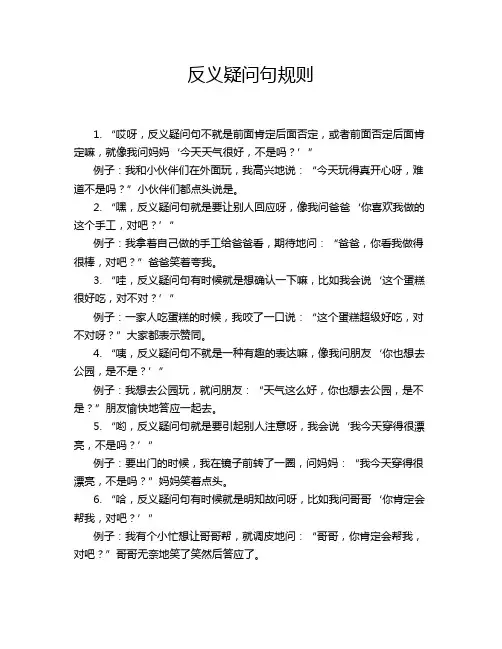
反义疑问句规则1. “哎呀,反义疑问句不就是前面肯定后面否定,或者前面否定后面肯定嘛,就像我问妈妈‘今天天气很好,不是吗?’”例子:我和小伙伴们在外面玩,我高兴地说:“今天玩得真开心呀,难道不是吗?”小伙伴们都点头说是。
2. “嘿,反义疑问句就是要让别人回应呀,像我问爸爸‘你喜欢我做的这个手工,对吧?’”例子:我拿着自己做的手工给爸爸看,期待地问:“爸爸,你看我做得很棒,对吧?”爸爸笑着夸我。
3. “哇,反义疑问句有时候就是想确认一下嘛,比如我会说‘这个蛋糕很好吃,对不对?’”例子:一家人吃蛋糕的时候,我咬了一口说:“这个蛋糕超级好吃,对不对呀?”大家都表示赞同。
4. “咦,反义疑问句不就是一种有趣的表达嘛,像我问朋友‘你也想去公园,是不是?’”例子:我想去公园玩,就问朋友:“天气这么好,你也想去公园,是不是?”朋友愉快地答应一起去。
5. “哟,反义疑问句就是要引起别人注意呀,我会说‘我今天穿得很漂亮,不是吗?’”例子:要出门的时候,我在镜子前转了一圈,问妈妈:“我今天穿得很漂亮,不是吗?”妈妈笑着点头。
6. “哈,反义疑问句有时候就是明知故问呀,比如我问哥哥‘你肯定会帮我,对吧?’”例子:我有个小忙想让哥哥帮,就调皮地问:“哥哥,你肯定会帮我,对吧?”哥哥无奈地笑了笑然后答应了。
7. “呐,反义疑问句就是这样的啦,像我问妹妹‘你也喜欢看动画片,是不是?’”例子:我和妹妹在看电视,我问她:“你也喜欢看动画片,是不是?”妹妹开心地说喜欢。
8. “嘿呀,反义疑问句能让对话更有意思呢,我会说‘你不会不喜欢吃冰淇淋吧?’”例子:我拿着冰淇淋问小伙伴:“这么好吃的冰淇淋,你不会不喜欢吃吧?”小伙伴赶紧说喜欢。
9. “哎呀呀,反义疑问句就是这样特别呀,像我问奶奶‘您最疼我了,对吧?’”例子:我依偎在奶奶身边,撒娇地问:“奶奶,您最疼我了,对吧?”奶奶满脸慈爱地说是。
10. “哇塞,反义疑问句可太有用啦,比如我问同学‘明天要上学,对吧?’”例子:放学的时候,我和同学讨论,我说:“明天要上学,对吧?”同学也说是呀。
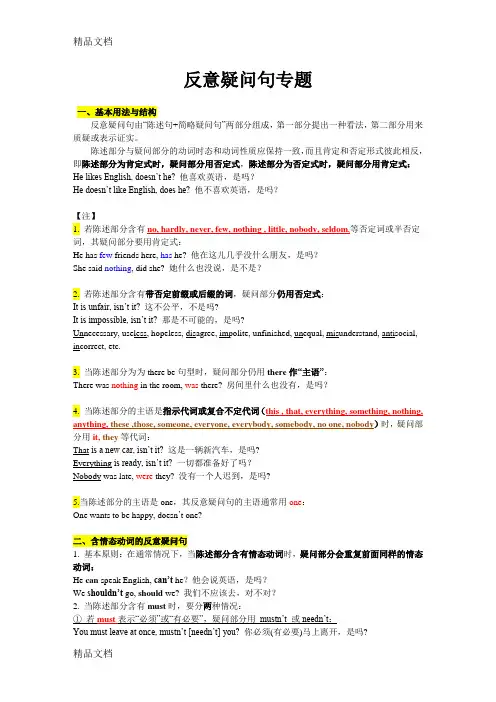
反意疑问句专题一、基本用法与结构反意疑问句由“陈述句+简略疑问句”两部分组成,第一部分提出一种看法,第二部分用来质疑或表示证实。
陈述部分与疑问部分的动词时态和动词性质应保持一致,而且肯定和否定形式彼此相反,即陈述部分为肯定式时,疑问部分用否定式,陈述部分为否定式时,疑问部分用肯定式:He likes English, doesn’t he? 他喜欢英语,是吗?He doesn’t like English, does he? 他不喜欢英语,是吗?【注】1. 若陈述部分含有no, hardly, never, few, nothing , little, nobody, seldom,等否定词或半否定词,其疑问部分要用肯定式:He has few friends here, has he? 他在这儿几乎没什么朋友,是吗?She said nothing, did she? 她什么也没说,是不是?2. 若陈述部分含有带否定前缀或后缀的词,疑问部分仍用否定式:It is unfair, isn’t it? 这不公平,不是吗?It is impossible, isn’t it? 那是不可能的,是吗?Unnecessary, useless, hopeless, disagree, impolite, unfinished, unequal, misunderstand, antisocial, incorrect, etc.3. 当陈述部分为为there be句型时,疑问部分仍用there作“主语”:There was nothing in the room, was there? 房间里什么也没有,是吗?4. 当陈述部分的主语是指示代词或复合不定代词(this , that, everything, something, nothing, anything, these ,those, someone, everyone, everybody, somebody, no one, nobody)时,疑问部分用it, they等代词:That is a new car, isn’t it? 这是一辆新汽车,是吗?Everything is ready, isn’t it? 一切都准备好了吗?Nobody was late, were they? 没有一个人迟到,是吗?5.当陈述部分的主语是one,其反意疑问句的主语通常用one:One wants to be happy, doesn’t one?二、含情态动词的反意疑问句1. 基本原则:在通常情况下,当陈述部分含有情态动词时,疑问部分会重复前面同样的情态动词:He can speak English, can’t he?他会说英语,是吗?We shouldn’t go, should we? 我们不应该去,对不对?2. 当陈述部分含有must时,要分两种情况:①若must表示“必须”或“有必要”,疑问部分用mustn’t 或needn’t:You must leave at once, mustn’t [needn’t] you? 你必须(有必要)马上离开,是吗?但是若陈述部分有mustn’t表示禁止,疑问部分要must:You mustn’t laugh, must you? 你不准笑,知道吗?②若must表示推测,疑问部分不能用must,而应根据must后的动词结构采用相应的动词形式:He must be tired,isn’t he? 他一定累了,是吗?The ground is wet. It must have rained yesterday, didn’t it?三、陈述部分为祈使句的反意疑问句1. 基本原则:若陈述部分为祈使句,疑问部分通常用will you:Please help us, wil l you? 请帮帮我们,好吗?Come with us, will you? 同我们一起去,好吗?Don’t forget to post the letter, will you? 请别忘了寄信。
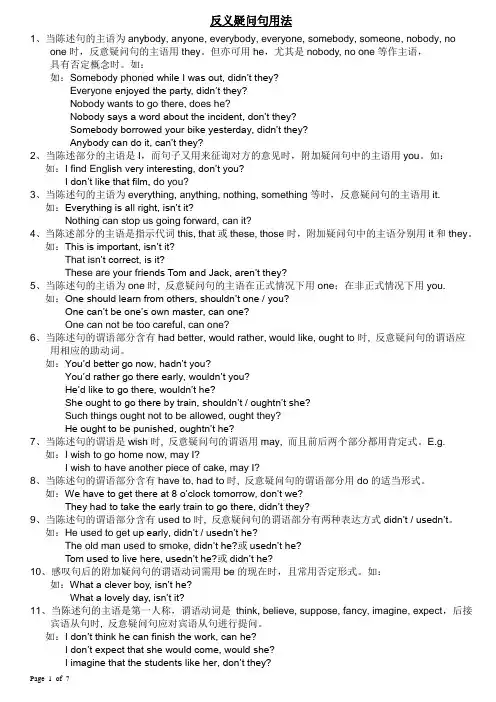
1、当陈述句的主语为anybody, anyone, everybody, everyone, somebody, someone, nobody, noone时,反意疑问句的主语用they。
但亦可用he,尤其是nobody, no one等作主语,具有否定概念时。
如:如:Somebody phone d while I was out, didn’t they?Everyone enjoyed the party, didn’t they?Nobody wants to go there, does he?Nobody says a word about the incident, don’t they?Somebody borrowed your bike yesterday, didn’t they?Anybody can do it, can’t they?2、当陈述部分的主语是I,而句子又用来征询对方的意见时,附加疑问句中的主语用you。
如:如:I find Engli sh very interesting, don’t you?I don’t like that film, do you?3、当陈述句的主语为everything, anything, nothing, something等时,反意疑问句的主语用it.如:Everything is all right, isn’t it?Nothing can stop us going forward, can it?4、当陈述部分的主语是指示代词this, that或these, those时,附加疑问句中的主语分别用it和they。
如:This is important, isn’t it?That isn’t correct, is it?These are your fri ends Tom and Jack, aren’t they?5、当陈述句的主语为one时, 反意疑问句的主语在正式情况下用one;在非正式情况下用you.如:One should learn from others, shouldn’t one / you?One can’t be one’s own master, can one?One can not be too careful, can one?6、当陈述句的谓语部分含有had better, would rather, would like, ought to时, 反意疑问句的谓语应用相应的助动词。
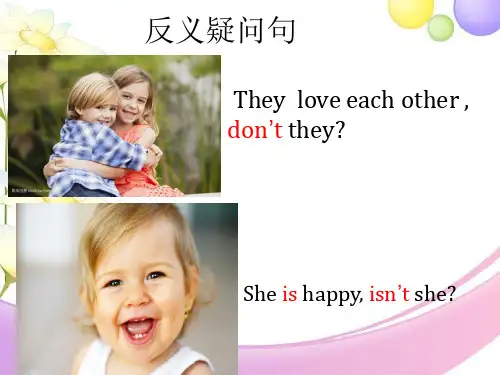
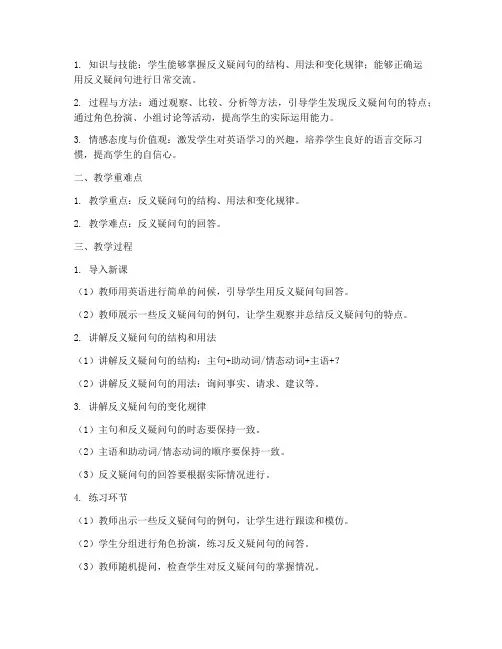
1. 知识与技能:学生能够掌握反义疑问句的结构、用法和变化规律;能够正确运用反义疑问句进行日常交流。
2. 过程与方法:通过观察、比较、分析等方法,引导学生发现反义疑问句的特点;通过角色扮演、小组讨论等活动,提高学生的实际运用能力。
3. 情感态度与价值观:激发学生对英语学习的兴趣,培养学生良好的语言交际习惯,提高学生的自信心。
二、教学重难点1. 教学重点:反义疑问句的结构、用法和变化规律。
2. 教学难点:反义疑问句的回答。
三、教学过程1. 导入新课(1)教师用英语进行简单的问候,引导学生用反义疑问句回答。
(2)教师展示一些反义疑问句的例句,让学生观察并总结反义疑问句的特点。
2. 讲解反义疑问句的结构和用法(1)讲解反义疑问句的结构:主句+助动词/情态动词+主语+?(2)讲解反义疑问句的用法:询问事实、请求、建议等。
3. 讲解反义疑问句的变化规律(1)主句和反义疑问句的时态要保持一致。
(2)主语和助动词/情态动词的顺序要保持一致。
(3)反义疑问句的回答要根据实际情况进行。
4. 练习环节(1)教师出示一些反义疑问句的例句,让学生进行跟读和模仿。
(2)学生分组进行角色扮演,练习反义疑问句的问答。
(3)教师随机提问,检查学生对反义疑问句的掌握情况。
5. 总结与拓展(1)教师总结反义疑问句的结构、用法和变化规律。
(2)布置课后作业,让学生用反义疑问句进行写作练习。
四、教学反思1. 教师在讲解反义疑问句时,要注重结合实际情境,让学生在具体的语境中理解和运用。
2. 在练习环节,教师要给予学生充分的练习机会,鼓励他们积极参与,提高他们的实际运用能力。
3. 教师要及时了解学生的学习情况,针对学生的薄弱环节进行有针对性的辅导,帮助他们克服困难。
4. 教师要关注学生的学习兴趣,激发他们的学习热情,提高他们的英语学习效果。
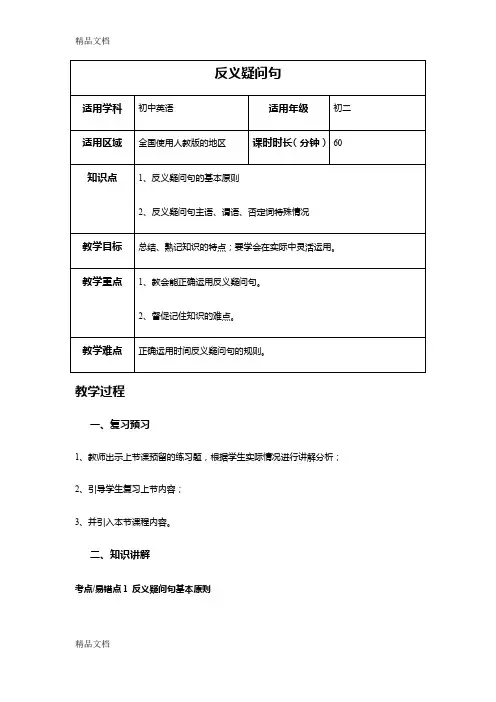
教学过程一、复习预习1、教师出示上节课预留的练习题,根据学生实际情况进行讲解分析;2、引导学生复习上节内容;3、并引入本节课程内容。
二、知识讲解考点/易错点1 反义疑问句基本原则1、遵循“前否后肯”或“前肯后否”的原则:Jim isn’t in Class Four, is he?2、前后两句主语相同:Mr Zhang has been here for four years, hasn’t he? 考点/易错点2 主语选用的特殊情况考点/易错点3 谓语选用特殊情况考点/易错点4 否定词的特殊情况句中有seldom, hardly, no, not, never, few, little, nothing, nobody, nowhere等是否定句,疑问部分必须采用肯定形式:Nobody phoned while I was out, did they?He is hardly able to swim, is he?There is little ink in your pen, is there?三、例题精析【1】I am right , ____________ ?答案:aren’t I【2】They can hardly believe it,________ ___________ ?答案:can they,他们很难相信(这件事),是吗?【3】Give me some money, _________ ____________?答案:will you,给我一些钱,好吗?四、课堂运用【基础】一、填空1.It’s very hot today, _______________ ?2. He can speak Chinese, _______________ ?3. Meimei studies in a middle school, _______________ ?4. He never gets up late , _______________ ?5. Don’t go out at night, _______________ ?【巩固】二、填空1.Everything starts to grow in spring, _______________ ?2.He can hardly finish his homework, _______________ ?3.I’m in Class 3,Grade 2, _______________ ?4.Let’s go shopping , _______________ ?5.She doesn’t like climbing hills , _______________ ?【拔高】三、单项选择1. Linda ate nothing this morning, ___?A. didn’t sheB. was sheC. did sheD. wasn’t she2. There’s hardly___ milk in the bottle, _____there?A. no, isn’tB. some, isC. little, isn’tD. any, is3. He has never ridden a horse before, ___?A. does heB. has heC. hasn’t heD. doesn’t he4. — He seldom came here, _____?— Yes sir.A. didn’t heB. does heC. doesn’t heD. did he5. Everything seems all right, _____ ?A. does itB. don’t theyC. won’t itD. doesn’t it7. One can’t be too modest, can _____ ?A. oneB. heC. itD. we8. No one failed in the exam, _____ ?A. was heB. did oneC. did theyD. didn’t he10. Neither you nor I am a artist, _____ ?A. am IB. aren’t weC. are weD. amn’t I答案:一、1 . isn’t it 2. can’t he 3.doesn’t she 4.does he 5.will you二、1.doe sn’t it 2.can he 3 .aren’t I 4.shall we 5.does she三、1—5 CDBDD 6—10 BACDC课程小结这节课我们主要学习了反义疑问句相关知识。
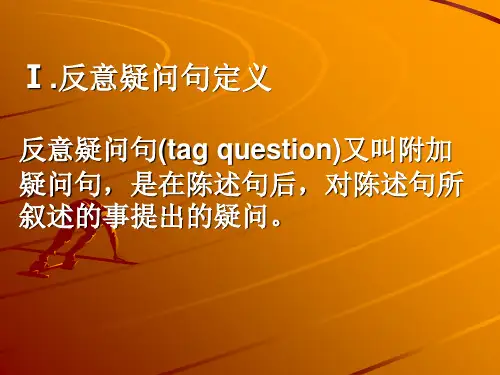
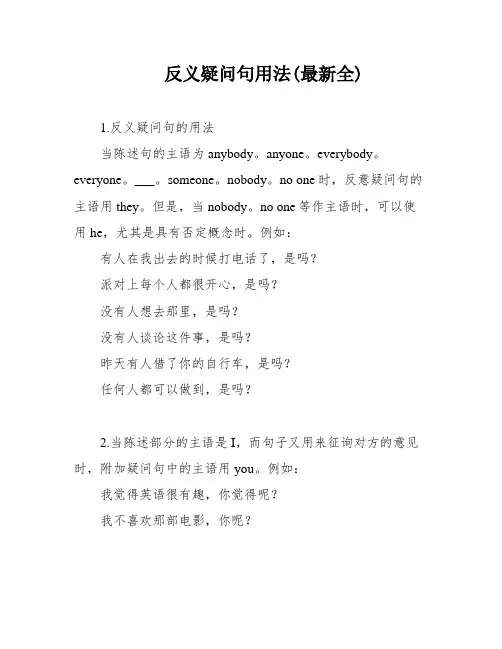
反义疑问句用法(最新全)1.反义疑问句的用法当陈述句的主语为anybody。
anyone。
everybody。
everyone。
___。
someone。
nobody。
no one时,反意疑问句的主语用they。
但是,当nobody。
no one等作主语时,可以使用he,尤其是具有否定概念时。
例如:有人在我出去的时候打电话了,是吗?派对上每个人都很开心,是吗?没有人想去那里,是吗?没有人谈论这件事,是吗?昨天有人借了你的自行车,是吗?任何人都可以做到,是吗?2.当陈述部分的主语是I,而句子又用来征询对方的意见时,附加疑问句中的主语用you。
例如:我觉得英语很有趣,你觉得呢?我不喜欢那部电影,你呢?3.当陈述句的主语为everything。
anything。
nothing。
something等时,反意疑问句的主语用it。
例如:一切都好,是吗?没有什么可以阻止我们前进,是吗?4.当陈述部分的主语是指示代词this。
that或these。
those 时,附加疑问句中的主语分别用it和they。
例如:这很重要,是吗?那不正确,是吗?这些是你的朋友___和___,是吗?5.当陈述句的主语为one时,在正式情况下反义疑问句的主语用one,在非正式情况下用you。
例如:人们应该向别人研究,不是吗?人不能成为自己的主人,是吗?When ___ such as "had better," "would rather," "would like,"or "ought to," the tag n should use the corresponding auxiliary verb。
For example。
"You'd better go now。
hadn't you?" or "He'd like to go there。

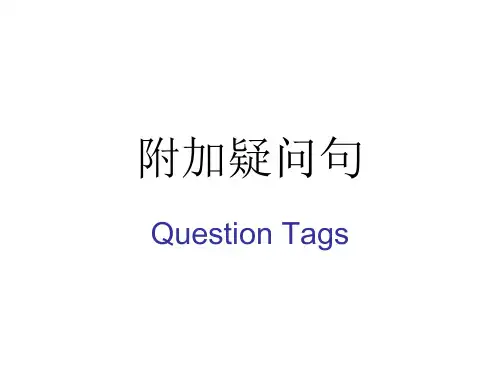
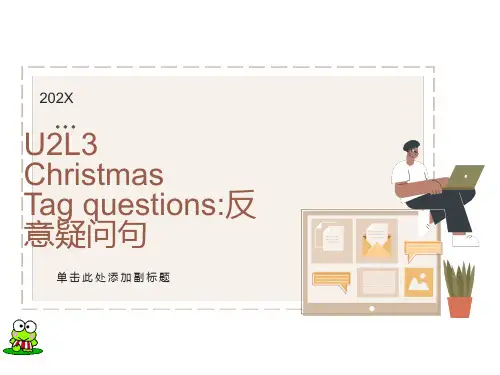
可编辑修改精选全文完整版初一反义疑问句【反义疑问句】〔一〕概念:反意疑问句是由陈述句和附在其后的附加疑问句组成。
其中附加疑问句是对陈述句所说的事实或观点提出疑问,起证实作用,一般用于证实说话者所说的事实或观点。
〔二〕要点注意:1、反意疑问句前后两局部谓语应是:“肯定陈述+否认疑问〞或“否认陈述+肯定疑问〞。
2、简单问句如果是否认式:not应与be,do,will等系动词、助动词、情态动词缩写。
3、简单问句的主语不用名词,应用人称代词。
4、陈述局部含“too...to〞时,是否认句。
〔三〕用法:1) 陈述局部I am时,疑问局部要用aren't I.I'm as tall as your sister,aren't I" 〔我和你姐姐一样高,对吗?〕2) 陈述局部用no, nothing, nobody, never, few, little, seldom, hardly等否认含义的词时,疑问局部用肯定含义。
如:The old man made no answer, did he"Jim is never late for school, is he"3) 陈述局部有情态动词have to +v. (had to + v.),疑问局部常用don't +主语〔didn't +主语〕。
We have to get there at eight tomorrow, don't we"used to,疑问局部用didn't +主语或usedn't +主语。
He used to take pictures there, didn't he" / usedn't he"had better〔最好〕+ v. 疑问句局部用hadn't you"You'd better read it by yourself, hadn't you"4) 陈述局部有would rather〔宁可、宁愿〕+v.,疑问局部多用wouldn't +主语。
1 【2 】.当陈述句的主语为anybody, anyone, everybody, everyone, somebody, someone,nobody, noone时,反意疑问句的主语用they.但亦可用he,尤其是nobody, no one等作主语,具有否认概念时.如:如:Somebody phoned while I was out, didn’t they?Everyone enjoyed the party, didn’t they?Nobody wants to go there, does he?Nobody says a word about the incident, don’t they?Somebody borrowed your bike yesterday, didn’t they?Anybody can do it, can’t they?2.当陈述部分的主语是I,而句子又用来征询对方的看法时,附加疑问句中的主语用you.如:如:I find English very interesting, don’t you?I don’t like th at film, do you?3.当陈述句的主语为everything, anything, nothing, something等时,反意疑问句的主语用it.如:Everything is all right, isn’t it?Nothing can stop us going forward, can it?4.当陈述部分的主语是指导代词this, that或these, those时,附加疑问句中的主语分离用it和they.如:This is important, isn’t it?That isn’t correct, is it?These are your friends Tom and Jack, aren’t they?5.当陈述句的主语为one时, 反意疑问句的主语在正式情形下用one;在非正式情形下用you.如:One should learn from others, shouldn’t one / you?One can’t be one’s own master, can one?One can not be too careful, can one?6.当陈述句的谓语部分含有had better, would rather, would like, ought to时, 反意疑问句的谓语应用响应的助动词.如:You’d better go now, hadn’t you?You’d rather go there early, wouldn’t you?He’d like to go there, wouldn’t he?She ought to go there by train, shouldn’t / oughtn’t she?Such things ought not to be allowed, ought they?He ought to be punished, oughtn’t he?7.当陈述句的谓语是wish时, 反意疑问句的谓语用may, 并且前后两个部分都用确定式.E.g.如:I wish to go home now, may I?I wish to have another piece of cake, may I?8.当陈述句的谓语部分含有have to, had to时, 反意疑问句的谓语部分用do的恰当情势.如:We have to get there at 8 o’clock tomorrow, don’t we?They had to take the early train to go there, didn’t they?9.当陈述句的谓语部分含有used to时, 反意疑问句的谓语部分有两种表达方法didn’t / usedn’t.如:He used to get up early, didn’t / usedn’t he?The old man used to smoke, didn’t he?或usedn’t he?Tom used to live here, usedn’t he?或didn’t he?10.感慨句后的附加疑问句的谓语动词需用be的如今时,且常用否认情势.如:如:What a clever boy, isn’t he?What a lovely day, isn’t it?11.当陈述句的主语是第一人称,谓语动词是 think, believe, suppose, fancy, imagine, expect,后接宾语从句时, 反意疑问句应对宾语从句进行提问.如:I don’t think he can finish the work, can he?I don’t expect that she would come, would she?I imagine that the students like her, don’t they?I don’t believe she knows it, does she?12.当陈述句的主语是第二,第三人称,谓语动词是 think, believe, suppose, fancy, imagine, expect后接宾语从句时, 反意疑问句应对主句进行提问.如:Mary thinks you will come to the meeting, doesn’t she?You don’t think English is important, do you?You think she is a good teacher, don’t you?Your brother thinks that you can d o the job well, doesn’t he?13.陈述部分带有seldom, hardly, never, rarely, few, little,nowhere, nothing, nobody,scarcely等否认词或半否认词时,附加疑问部分的动词用确定情势.如:如:Bob rarely got drunk, did he?Few people know him, do they?She seldom goes to the cinema, does she?He has few good reasons for staying, has he?She hardly writes to you, does she?There is little water in the bottle, is there?假如陈述部分的否认词带有否认前缀,那么,该陈述部分作确定处理,附加疑问部分一般仍用否定情势.如:如:He was unsuccessful, wasn’t he?Tom dislikes the book, doesn’t he?14.祈使句的各类反意疑问句:1). Let’s …, shall we? E.g. Let’s go to the film, shall we?2). Let us … , will you? E.g. Let us go to the park, will you?3). Let me … , may I / will you ?E.g. Let me go there alone, may I? / will you?If you want help-money or anything, let me know, will you?4). 在否认的祈使句的后面,只能用will you? E.g. Don’t tell anyone, will you?5). 表示“要求” 意思的祈使句,反意疑问句用will you?E.g. Pass me the dictionary, will you?Stop that noise, will you?6). 表示“邀请”, “劝诱” 意思的祈使句,反意疑问句用won’t you?E.g. Join us in the singing, won’t you?15.陈述句中谓语动词是must + have + 动词的曩昔分词时,假如强调对曩昔情形的推想, 根据是(句中有曩昔的时光状语),反意疑问句根据动词用didn’t / wasn’t / weren’t +主语.如:You must have read the story last term, didn’t you?He must have met her yesterday, didn’t he?16.陈述句中谓语动词是must + have + 动词的曩昔分词时,假如只强调动作的完成,反意疑问句用haven’t / hasn’t +主语.如:She must have arrived there, hasn’t she?You must have seen the film, haven’t you?17.陈述句中谓语动词是must + 动词本相的情形:You must see the doctor, needn’t you? (must在这里不表示”必须”,只表示”有必要”,所以不重复must, 要用need)如:You mustn’t do that again, must you?The food must be nice, isn’t it? (must be在这里表示推想,要用be 的恰当情势)The boys mustn’t play with fire, may they? (当must表示”制止”时,反意问句要用may.) 18.当陈述句的主语为each时, 反意疑问句的主语用he.如:Each has his strong points, hasn’t he? / doesn’t he?19.当陈述句的主语为each of us, each of you, each of them时, 反意疑问句的主语用we, you,they.如:Each of us has been here, haven’t we?Each of them has an English dictionary, haven’t they?20.当陈述句的主语为each of … 构造时,反意疑问句的主语用he ,she, it 强调个别, 用we, you,they 强调全部.如:Each of these novels is to be discussed this term, isn’t it?Each of us have got the prize, haven’t we?21.当陈述部分是并列句,附加疑问句则需和就近的分句的主语和谓语一致.如:如:It must have rained last night, for the ground is wet, isn’t it?Tom has been writing letters all afternoon, b ut he has finished now, hasn’t he?We must start at once or we can’t get there on time, can we?He is a teacher but his wife isn’t a teacher, is she?Xiao Lin has been writing letters all afternoon but he should finish them now, shouldn’t he?22.当陈述部分为主从复合句时,附加疑问部分一般应与主句的主语和谓语动词保持对应关系.如:如:She says that I did it, doesn’t she?I told them not everybody could do it,didn’t I?She is not so stupid as she looks, is she?Lucy dreamed that she was in the moon, didn’t she?但当陈述部分的主语是I,谓语是think, believe, suppose, expect这类动词时,附加疑问部分则往往与从句中的主语和谓语动词保持对应关系,但要留意否认的转移.I suppose that he’s serious isn’t he?I don’t think she cares, does she?23.陈述句主语为such时,反意疑问句的主语单数用it,复数用they.如:Such is his trick, isn’t it?Such are your excuses, aren’t they?24.当陈述句是I am … 构造时,反意疑问句用aren’t I.如:I am right, aren’t I?I am late, aren’t I?25.假如陈述句中的否认式仅仅是带有否认的词缀,反意疑问句仍用否认.如:He is unfit for his job, isn’t he?That’s unfair, isn’t it?26.当陈述句部分是there used to be … 构造时, 反意疑问句用wasn’t (weren’t) there.如:There used to be three pi ne trees in the yard, weren’t there?There used to be shop at the corner of the street, wasn’t there?27.陈述句中谓语动词是may / might 时,反意疑问句用mayn’t / mightn’t组成.如:I may come and borrow your bike tomorrow, mayn’t I?The experience may have been long in your memory, mayn’t it?28.陈述句子中的主语为动词不定式短语.动名词短语或其他短语时,疑问部分的主语平日用it.如:Learning how to repair motors takes a long time, doesn’t it?Between six and seven will suit you, won’t it?Where to hold the meeting has not been decided, has it?That China is a great soc ialist country is well known, isn’t it?29.陈述部分为there+be构造,疑问部分用there,省略主语代词.如:There is something wrong with your TV set, isn’t there?30.陈述部分的谓语含有dare, need时,看它们是情态动词照样行动动词,分离反复dare, need或用do 的恰当情势.如:The girl daren’t go home alone, dare she?31.在"none of…"构造中,如of 后的名词或代词是单数,后面的主语也为单数,这种情形,重要因为of 后的名词或代词为不可数名词.如:None of it is here, is it?32.在白话和非正式体裁中,为了增强语气,只是表示某种惊异.疑惑.反感.讥讽等情感而并不是为了追求答复,这时前后两部分的确定.否认是一致的.如:Oh, he is a writer, is he?You’ll not go, won’t you?33.当陈述部分带有表示“所有”寄义的动词have(has)时,疑问部分既可用have情势,也可用do情势.如:You have a new bike, haven’t you(或don’t you)?She doesn’t have any money in her pocket, does she?反义疑问句演习一.完成下列句子1.Few of them hurt themselves in the accident last night, ___________ ?2.--You’ve never seen dinosaur eggs, have you ?--_______________. How I wish to visit the Dinosaur World.3.His sister had a bad cough, _________she?4.Mr. Green went to Shenzhen on business last week, ________?5.John can hardly understand any Chinese, _________he?6.Don’t smoke in the meeting-room, _________?7.Lucy, you clean the blackboard today, _______?8.Miss Cheng will never forget her first visit to Canada ,________?9.The lady couldn’t say a word when she saw the snake,__________?10.__________the population of china? 1,300,000,000.11.---______I go and meet you at the airport?---No ,thanks, dear . I can take a taxi home.12.------________is the Confucian Temple(孔庙) from here?------It’s about 10 minutes’ walk.13.-----_________may I keep these books?-----two weeks.14.Tina is unhappy now, ____________?15.---You won’t follow his example, will you ?---________________, I don’t think he is right.16.----__________do you go to Hong Kong?----sorry , I’ve never been there.17.---The boy has to stay at home to look after his little sister,_________?---Yes, because his mother has gone shopping.18.----You lent me some money a few months ago.-----_________? I don’t remember lending you any money.19.My uncle has never been to a foreign country,_____________?20.There is some water in that bottle, ___________?21.----_____________will the foreign students be back from NanJing?----In two days, I think.22.---Let’s go and play football,__________?---That’s wonderful.23.I don’t think that the necklace is made of diamond, __________?24.His wife had the carpets and the curtains cleaned, ____________?25.It’s my son’s wedding next week, and I have to do my best for that,__________?26.Harry wouldn’t become a teacher if it hadn’t been for the holiday, __________?27.No one left here yesterday,_____________?28.Birds rarely build nests in our garden,_____________?29.You must have been to the Great Wall, ____________?30.Learning how to repair motors takes a long time, _____________?31.They must have stayed at home last night,____________?32..There’s not much news in today’s newspaper, _____________?33.They need our help badly at the moment, ______________?34.She is unfit for the position, _____________?35.I wish to visit America, _____________?36.She’s been a worker here for many years, ______________?37.What beautiful flowers, ______________?38.Mother used to live in a poor village, ____________?39.You’d better go at once, _____________?40.I am very interested in Mark Twain’s novels, ____________?41.He never gets up late, _____________?42.Don’t go out, ______________?43.Everything begins to grow in spring, ______________?44.He can hardly finish the work, _____________?45.Let us go home, ____________?46.You think he is a good student, ____________?47.Nobody knows where she lives, ______________?48.Few students can answer the question, ________________?49.You needn’t attend the meeting, ______________?50.We need to come on Sunday, _____________?二.选择填空1. You’d rather watch TV this evening, ______?a. isn’t itb. hadn’t youc. wouldn’t youd. won’t you2. I suppose you’re not going today, ______?a. are youb. do youc. don’t youd. aren’t you3. I wish to shake hands with you, ______?a. shallb. may Ic. do Id. will I4. Three hours ought to be enough time, ______?a. oughtn’t three hoursb. didn’t theyc. shouldn’t itd. shouldn’t three hours5. They have to study a lot, ______?a. don’t theyb. haven’t theyc. did theyd. hadn’t they6. When the car crashed, your brother escaped being hurt, ______ ?a. didn’t heb. did hec. did itd. didn’t it7. I'm sure dirty, ______?a. am Ib. isn’t Ic. aren’t Id. am not I8. You seem to be dissatisfied with your present post. I don’t think you judged your abilityobjectively when you applied for it, ______ you?a. dob. didc. don’td. didn’t9. That’s the sort of the book you want, ______?a. is itb. isn’t thatc. is thatd. isn’t it10. All these dictionaries are a great help to you, ______?a. are theyb. aren’t theyc. are all these dictionariesd. aren’t all these dictionaries11. The movie that we saw last week was quite interesting, ______?a. wasn’t itb. was itc. didn’t wed. weren’t we12. Tom has been writing letters all afternoon, but he should have finished them by now,______?a. hasn’t heb. has hec. shouldn’t hed. didn’t you13. David told me that you would take a trip to America, ______?a. would youb. wouldn’t youc. did youd. didn’t you14. There appeared to be no better way, _______?a. was thereb. were therec. did thered. didn’t there15. You has some trouble finding where I live, ______?a. didn’t youb. hadn’t youc. do Id. don’t I16. He has his hair cut every month, ______?a. has heb. hasn’t hec. does hed. doesn’t he17. Your friend needs to come earlier, ______?a. does heb. doesn’t hec. need hed. needn’t he18. The little boy dare not go to church, ______?a. dare heb. daren’t hec. does hed. doesn’t he19. Susan’d have worked abroad if she’d had the chance, ______?a. has sheb. hadn’t shec. would shed. wouldn’t she20. Everyone’s having a good time, ______?a. is heb. isn’t everyonec. does hed. aren’t they21. Any one can join the club, ______?a. can any oneb. can’t any onec. can’t theyd. can they22. Tell me how to operate the electronic computer, ______?a. will youb. shan’t youc. do youd. don’t you23. Magaret scarcely comes to visit you on Christmas Day, ______?a. doesn’t sheb. does shec. do youd. don’t you24. Let’s listen to the radio program that the teacher mentioned, ______?a. d o web. don’t wec. shall wed. shan’t we25. You think you’re funny, ______?a. didn’t youb. are youc. don’t youd. do you26. Janet used to take part in labor in that village, ______?a. used sheb. did shec. didn’t shed. should she27. What beautiful weather, ______?a. is itb. isn’t itc. won’t itd. doesn’t it28. He ought to go to Kwangchow by plane, ______?a. should heb. shouldn’t hec. would hed. wouldn’t he29. We never dared to ask him a question, ______?a. did web. didn’t wec. dared wed. daren’t we30. Nobody will believe how difficult his work has been ______?a. will heb. won’t nobodyc. will theyd. won’t they31. You must have made the mistake, ______?a. mustn’t youb. haven’t youc. didn’t youd. hadn’t you32. Learning how to repair computers takes a long time, ______?a. isn’t itb. aren’t theyc. doesn’t itd. don’t they33. Jack has coffee with breakfast, ______?a. hasn’t Jackb. hasn’t hec. doesn’t Jackd. doesn’t he34. They must have stayed at hotel last night, ______?a. mustn’t theyb. haven’t theyc. didn’t theyd. hadn’t they35. There isn’t anything wrong with the radio, ______?a. is thereb. is itc. does itd. does there36. You must be hungry, ______?a. must youb. mustn’t youc. are youd. aren’t you37. Let’s do the exercises by ourselves, ______?a. shall web. shan’t wec. will youd. will we38. Her daughter had the carpets and curtains cleaned, ______?a. had sheb. hadn’t shec. didn’t shed. didn’t her daughter39. The teacher had a talk with you, ______?a. has youb. hadn’t shec. did shed. didn’t she40. Something’ll have to be done about the air pollution, ______?a. won’t itb. will itc. has itd. does it答案:一.完成下列句子1.did they2.No, I haven’t3.didn’t4.didn’t he5.can6.will you7.will you8.will she9.could she10.What’s11.Shall 12.How far13.How long14.isn’t she15.No, I won’t16.How often17.doesn’t he18.Did I19.has he20.isn’t there21.How soon22.shall we23.is it24.didn’t she25.don’t I26.would he27.did they28.do they29.haven’t you30.doesn’t it31.didn’t they32.is there33.don’t they34.i sn’t she35.may I36.hasn’t she37.aren’t theyedn’ t she/didn’t she39.hadn’t you40.aren’t I41.does he42.will you43.doesn’t it44.can he45.will you46.don’t you47.do they/does he48.can they49.need you50.don’t we二.选择填空。
1、当陈述句的主语为anybody, anyone, everybody, everyone, somebody, someone, nobody, noone时,反意疑问句的主语用they。
但亦可用he,尤其是nobody, no one等作主语,具有否定概念时。
如:如:Somebody phone d while I was out, didn’t they?Everyone enjoyed the party, didn’t they?Nobody wants to go there, does he?Nobody says a word about the incident, don’t they?Somebody borrowed your bike yesterday, didn’t they?Anybody can do it, can’t they?2、当陈述部分的主语是I,而句子又用来征询对方的意见时,附加疑问句中的主语用you。
如:如:I find Engli sh very interesting, don’t you?I don’t like that film, do you?3、当陈述句的主语为everything, anything, nothing, something等时,反意疑问句的主语用it.如:Everything is all right, isn’t it?Nothing can stop us going forward, can it?4、当陈述部分的主语是指示代词this, that或these, those时,附加疑问句中的主语分别用it和they。
如:This is important, isn’t it?That isn’t correct, is it?These are your fri ends Tom and Jack, aren’t they?5、当陈述句的主语为one时, 反意疑问句的主语在正式情况下用one;在非正式情况下用you.如:One should learn from others, shouldn’t one / you?One can’t be one’s own master, can one?One can not be too careful, can one?6、当陈述句的谓语部分含有had better, would rather, would like, ought to时, 反意疑问句的谓语应用相应的助动词。
如:You’d better go now, hadn’t you?You’d rather go there early, wouldn’t you?He’d like to go there, wouldn’t he?She ought to go there by train, shouldn’t / oughtn’t she?Such things ought not to be allowed, ought they?He ought to be punished, oughtn’t he?7、当陈述句的谓语是wish时, 反意疑问句的谓语用may, 而且前后两个部分都用肯定式。
E.g.如:I wish to go home now, may I?I wish to have another piece of cake, may I?8、当陈述句的谓语部分含有have to, had to时, 反意疑问句的谓语部分用do的适当形式。
如:We have to get there at 8 o’clock tomorrow, don’t we?They had to take the early train to go there, didn’t they?9、当陈述句的谓语部分含有used to时, 反意疑问句的谓语部分有两种表达方式didn’t / usedn’t。
如:He used to get up early, didn’t / usedn’t he?The old man used to smoke, di dn’t he?或usedn’t he?Tom used to live here, usedn’t he?或didn’t he?10、感叹句后的附加疑问句的谓语动词需用be的现在时,且常用否定形式。
如:如:What a clever boy, isn’t he?What a lovely day, isn’t it?11、当陈述句的主语是第一人称,谓语动词是think, believe, suppose, fancy, imagine, expect,后接宾语从句时, 反意疑问句应对宾语从句进行提问。
如:I don’t think he can finish the work, can he?I don’t expect that she would come, would she?I imagine that the students like her, don’t they?I don’t believe she knows it, does she?12、当陈述句的主语是第二,第三人称,谓语动词是think, believe, suppose, fancy, imagine, expect后接宾语从句时, 反意疑问句应对主句进行提问。
如:Mary thinks you will come to the meeting, doesn’t she?You don’t think English is important, do you?You think she is a good teacher, don’t you?Your brother thinks that you can do the job well, doesn’t he?13、陈述部分带有seldom, hardly, never, rarely, few, little, nowhere, nothing, nobody, scarcely等否定词或半否定词时,附加疑问部分的动词用肯定形式。
如:如:Bob rarely got drunk, did he?Few people know him, do they?She seldom goes to the cinema, does she?He has few good reasons for staying, has he?She hardly writes to you, does she?There is little water in the bottle, is there?如果陈述部分的否定词带有否定前缀,那么,该陈述部分作肯定处理,附加疑问部分一般仍用否定形式。
如:如:He was unsuccessful, wasn’t he?Tom dislikes the book, doesn’t he?14、祈使句的各种反意疑问句:1). Let’s …, shall we? E.g. Let’s go to the film, shall we?2). Let us … , will you? E.g. Let us go to the park, will you?3). Let me … , may I / will you ?E.g. Let me go there alone, may I? / will you?If you want help-money or anything, let me know, will you?4). 在否定的祈使句的后面,只能用will you? E.g. Don’t tell anyone, will you?5). 表示“请求” 意思的祈使句,反意疑问句用will you?E.g. Pass me the dictionary, will you?Stop that noise, will you?6). 表示“邀请”, “劝诱” 意思的祈使句,反意疑问句用won’t you?E.g. Join us in the singing, won’t you?15、陈述句中谓语动词是must + have + 动词的过去分词时,如果强调对过去情况的推测, 依据是(句中有过去的时间状语),反意疑问句根据动词用didn’t / wasn’t / weren’t +主语。
如:You must have read the story last term, didn’t you?He must have met her yesterday, didn’t he?16、陈述句中谓语动词是must + have + 动词的过去分词时,如果只强调动作的完成,反意疑问句用haven’t / hasn’t +主语。
如:She mus t have arrived there, hasn’t she?You must have seen the film, haven’t you?17、陈述句中谓语动词是must + 动词原形的情况:You must see the doctor, needn’t you? (must在这里不表示”必须”,只表示”有必要”,所以不重复must, 要用need)如:You mustn’t do that again, must you?The food must be nice, isn’t it? (must be在这里表示推测,要用be 的适当形式)The boys mustn’t play with fire, may they? (当must表示”禁止”时,反意问句要用may.) 18、当陈述句的主语为each时, 反意疑问句的主语用he。
如:Each has his strong points, hasn’t he? / doesn’t he?19、当陈述句的主语为each of us, each of you, each of them时, 反意疑问句的主语用we, you,they。
如:Each of us has been here, haven’t we?Each of them has an English dictionary, haven’t they?20、当陈述句的主语为each of … 结构时,反意疑问句的主语用he ,she, it 强调个体, 用we, you,they 强调全体。
如:Each of these novels is to be discussed this term, isn’t it?Each of us h ave got the prize, haven’t we?21、当陈述部分是并列句,附加疑问句则需和就近的分句的主语和谓语一致。